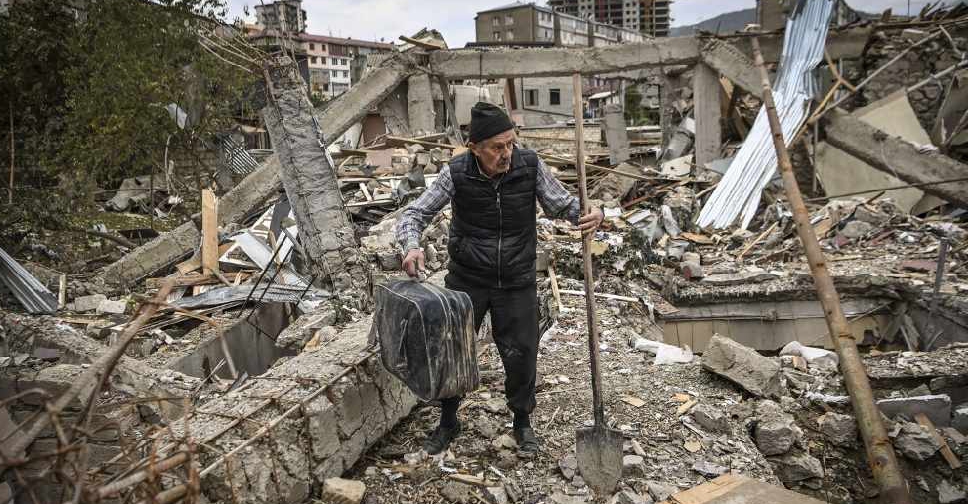
A Russian-brokered humanitarian ceasefire in Nagorno-Karabakh was under severe strain on Sunday, a day after it was agreed, with Azerbaijan and Armenia accusing each other of serious violations.
The ceasefire, clinched after marathon talks in Moscow advocated by President Vladimir Putin, was meant to halt fighting to allow ethnic Armenian forces in Nagorno-Karabakh and Azeri forces to swap prisoners and war dead.
The Moscow talks were the first diplomatic contact between the two since fighting over the mountainous enclave erupted on September 27, killing hundreds of people. The enclave is internationally recognised as part of Azerbaijan, but is populated and governed by ethnic Armenians.
Both sides accused one another of breaking the ceasefire almost immediately on Saturday, and Azerbaijan gave the impression in public comments from top officials that it saw it as only a brief and temporary breathing space anyway.
On Sunday, Azerbaijan accused Armenia of heavily shelling a residential area in Ganja, its second largest city, in the early hours of the morning, and of hitting an apartment building.
The Azeri Prosecutor General's Office said nine people had been killed and 34 wounded in the attack. Reuters could not independently verify Azeri assertions about the number of fatalities or injured.
A Reuters photographer in Ganja saw rescue workers carrying one dead person from the ruins of the apartment building on Sunday morning. The structure had been almost levelled. An excavator was clearing the debris.
Buildings and cars in the immediate vicinity had also been severely damaged.
Baku says more than 40 civilians had been killed and 200 injured since the start of the conflict.
The Armenian defence ministry called the Azeri allegations about the attack on Ganja "an absolute lie" and accused Azerbaijan of continuing to shell populated areas inside Karabakh, including Stepanakert, the region's biggest city.
Reuters footage from Stepanakert showed a small brick house damaged by shelling, its windows shattered and its roof caved in. The Karabakh authorities said 429 servicemen had been killed since fighting erupted last month.
Azerbaijan accused Armenia of also launching an unsuccessful rocket attack on an Azeri hydro-electric power station in Mingachevir. Ethnic Armenian forces in Karabakh denied the assertion.
Arayik Haratyunyan, the leader of ethnic Armenian forces in Nagorno-Karabakh, described the situation as relatively calm on Sunday morning, but said he did not know how long it would last and that the frontline remained tense.
He accused Azeri forces of trying to unsuccessfully take control of the town of Hadrut, and said the process of the two sides exchanging prisoners should have started on Sunday, but that it was unclear if and when that would happen.
Renewed fighting in the decades-old conflict has raised fears of a wider war drawing in Turkey, a close ally of Azerbaijan, and Russia, which has a defence pact with Armenia.
The clashes have also increased concern about the security of pipelines that carry Azeri oil and gas to Europe.
The fighting is the worst since a 1991-94 war that killed about 30,000 people and ended with a ceasefire that has been violated repeatedly.

 Iranian President Raisi killed in helicopter accident, state media says
Iranian President Raisi killed in helicopter accident, state media says
 ICC prosecutor seeks arrest warrants for Israeli, Hamas leaders
ICC prosecutor seeks arrest warrants for Israeli, Hamas leaders
 Assange given permission to appeal against US extradition
Assange given permission to appeal against US extradition
 Israel intends to broaden Rafah sweep, Defence Minister tells US
Israel intends to broaden Rafah sweep, Defence Minister tells US
 New Taiwanese president calls on China to stop threats
New Taiwanese president calls on China to stop threats



